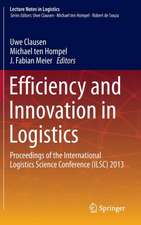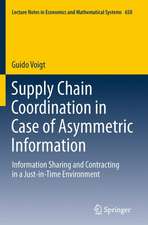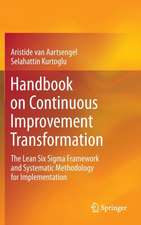Real Options and Strategic Technology Venturing: A New Paradigm in Decision Making: SpringerBriefs in Business, cartea 31
Autor Caroline M. Sipp, Carayannis Elias G.en Limba Engleză Paperback – 16 noi 2012
This analysis shows that an environment presenting co-opetitive (simultaneous competition and collaboration) conditions triggers the use of real options (why), that serve to transform the position, posture and propensity of businesses to innovate and thus they co-evolve (when) into more effective and efficient forms of businesses (co-specialization) (how). The authors demonstrate that embracing risk and uncertainty can increase levels and probability of new venture formation. However, their simulation also shows that it should be adapted to the risk profile of the firm and that timing is also a factor to be considered. Although engaging the concepts of real options, this analysis does not focus on a specific investment valuation methodology, but highlights the relationship between knowledge and risk and rather addresses the management of mindsets, as moving towards a systematic conceptualization of real options represents a different paradigm in decision making.
Din seria SpringerBriefs in Business
-
 Preț: 316.75 lei
Preț: 316.75 lei -
 Preț: 262.86 lei
Preț: 262.86 lei -
 Preț: 382.75 lei
Preț: 382.75 lei -
 Preț: 410.39 lei
Preț: 410.39 lei -
 Preț: 380.25 lei
Preț: 380.25 lei -
 Preț: 414.21 lei
Preț: 414.21 lei -
 Preț: 341.97 lei
Preț: 341.97 lei -
 Preț: 476.95 lei
Preț: 476.95 lei -
 Preț: 342.74 lei
Preț: 342.74 lei -
 Preț: 380.25 lei
Preț: 380.25 lei -
 Preț: 385.84 lei
Preț: 385.84 lei -
 Preț: 343.98 lei
Preț: 343.98 lei -
 Preț: 378.54 lei
Preț: 378.54 lei -
 Preț: 375.45 lei
Preț: 375.45 lei -
 Preț: 443.75 lei
Preț: 443.75 lei -
 Preț: 444.74 lei
Preț: 444.74 lei -
 Preț: 476.03 lei
Preț: 476.03 lei -
 Preț: 379.48 lei
Preț: 379.48 lei -
 Preț: 340.83 lei
Preț: 340.83 lei -
 Preț: 377.18 lei
Preț: 377.18 lei -
 Preț: 345.50 lei
Preț: 345.50 lei -
 Preț: 376.43 lei
Preț: 376.43 lei -
 Preț: 378.12 lei
Preț: 378.12 lei -
 Preț: 345.45 lei
Preț: 345.45 lei -
 Preț: 343.97 lei
Preț: 343.97 lei -
 Preț: 376.59 lei
Preț: 376.59 lei -
 Preț: 341.64 lei
Preț: 341.64 lei -
 Preț: 341.75 lei
Preț: 341.75 lei -
 Preț: 344.14 lei
Preț: 344.14 lei -
 Preț: 377.18 lei
Preț: 377.18 lei -
 Preț: 377.95 lei
Preț: 377.95 lei -
 Preț: 343.72 lei
Preț: 343.72 lei -
 Preț: 374.08 lei
Preț: 374.08 lei -
 Preț: 375.23 lei
Preț: 375.23 lei -
 Preț: 375.62 lei
Preț: 375.62 lei -
 Preț: 376.43 lei
Preț: 376.43 lei -
 Preț: 377.73 lei
Preț: 377.73 lei -
 Preț: 376.22 lei
Preț: 376.22 lei -
 Preț: 347.32 lei
Preț: 347.32 lei -
 Preț: 376.59 lei
Preț: 376.59 lei -
 Preț: 376.22 lei
Preț: 376.22 lei -
 Preț: 343.72 lei
Preț: 343.72 lei -
 Preț: 383.12 lei
Preț: 383.12 lei -
 Preț: 376.22 lei
Preț: 376.22 lei -
 Preț: 374.85 lei
Preț: 374.85 lei -
 Preț: 346.86 lei
Preț: 346.86 lei -
 Preț: 376.22 lei
Preț: 376.22 lei -
 Preț: 342.74 lei
Preț: 342.74 lei -
 Preț: 377.73 lei
Preț: 377.73 lei -
 Preț: 379.09 lei
Preț: 379.09 lei
Preț: 345.63 lei
Nou
Puncte Express: 518
Preț estimativ în valută:
66.16€ • 71.89$ • 55.61£
66.16€ • 71.89$ • 55.61£
Carte tipărită la comandă
Livrare economică 21 aprilie-05 mai
Preluare comenzi: 021 569.72.76
Specificații
ISBN-13: 9781461458135
ISBN-10: 1461458137
Pagini: 140
Ilustrații: XIII, 124 p. 23 illus., 14 illus. in color.
Dimensiuni: 155 x 235 x 7 mm
Greutate: 0.2 kg
Ediția:2013
Editura: Springer
Colecția Springer
Seria SpringerBriefs in Business
Locul publicării:New York, NY, United States
ISBN-10: 1461458137
Pagini: 140
Ilustrații: XIII, 124 p. 23 illus., 14 illus. in color.
Dimensiuni: 155 x 235 x 7 mm
Greutate: 0.2 kg
Ediția:2013
Editura: Springer
Colecția Springer
Seria SpringerBriefs in Business
Locul publicării:New York, NY, United States
Public țintă
ResearchCuprins
List of Figures.- List of Tables.- Chapter I. Conceptual framework.- Chapter II. Literature Review.- Chapter III. Findings.- Chapter IV. Conclusions.- Glossary.- References.- Annex I. Bibliography on Real Options and Strategic Decision Making.- Annex II. List of Survey Questions.- Annex III. List of Interview Topics.- Annex IV. Simulation Design.- Annex V. Survey TD and TB Profiles.- Annex VI. Wilcoxon Rank-Sum (Mann-Whitney) Tests.
Textul de pe ultima copertă
This book seeks to answer “why, when and how are real options used in strategic technology venturing?” This work tests for the role of real options in decision making involving three types of firms in decreasing order of technology-dependence – technology-driven (TD) (where the profit is fully dependent on new technology creation and leveraging), technology-based (TB) (where the profit is enabled and supported by technology) and technology-neutral (TN) (where the profit is almost independent of technology). It also deals with strategic and non-strategic types of decisions driven by real options.
This analysis shows that an environment presenting co-opetitive (simultaneous competition and collaboration) conditions triggers the use of real options (why), that serve to transform the position, posture and propensity of businesses to innovate and thus they co-evolve (when) into more effective and efficient forms of businesses (co-specialization) (how). The authors demonstrate that embracing risk and uncertainty can increase levels and probability of new venture formation. However, their simulation also shows that it should be adapted to the risk profile of the firm and that timing is also a factor to be considered. Although engaging the concepts of real options, this analysis does not focus on a specific investment valuation methodology, but highlights the relationship between knowledge and risk and rather addresses the management of mindsets, as moving towards a systematic conceptualization of real options represents a different paradigm in decision making.
This analysis shows that an environment presenting co-opetitive (simultaneous competition and collaboration) conditions triggers the use of real options (why), that serve to transform the position, posture and propensity of businesses to innovate and thus they co-evolve (when) into more effective and efficient forms of businesses (co-specialization) (how). The authors demonstrate that embracing risk and uncertainty can increase levels and probability of new venture formation. However, their simulation also shows that it should be adapted to the risk profile of the firm and that timing is also a factor to be considered. Although engaging the concepts of real options, this analysis does not focus on a specific investment valuation methodology, but highlights the relationship between knowledge and risk and rather addresses the management of mindsets, as moving towards a systematic conceptualization of real options represents a different paradigm in decision making.
Caracteristici
Includes supplementary material: sn.pub/extras












